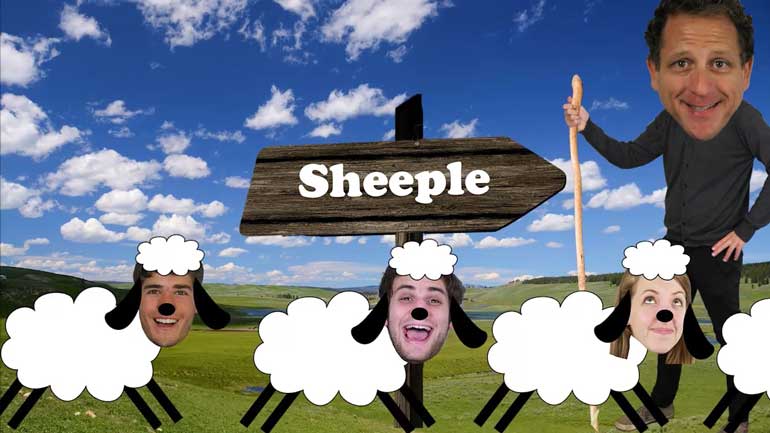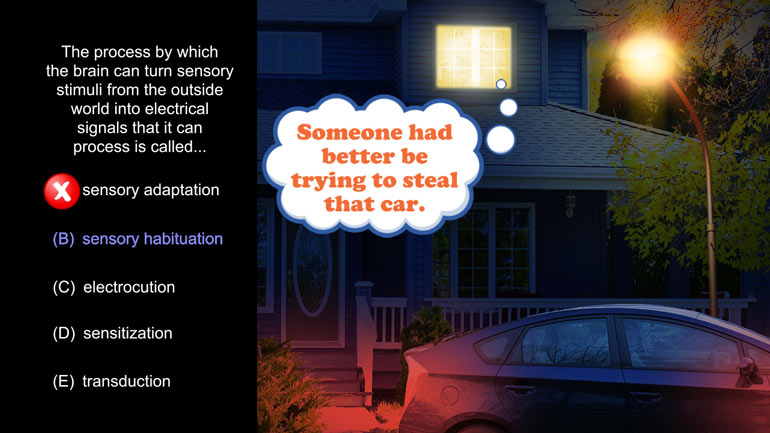ShmoopTube
Where Monty Python meets your 10th grade teacher.
Search Thousands of Shmoop Videos
AP Psychology 1.4 Developmental Psychology 20 Views
Share It!
Description:
AP Psychology 1.4 Developmental Psychology. What is Tom's level of moral development?
Transcript
- 00:04
And here's your shmoop du jour brought to you by hypothetical
- 00:07
questions because if the world were to end tomorrow wouldn't you want to have [Girl thinking about the world ending]
- 00:11
seen this video first.... Thomas presented with a moral dilemma
- 00:16
and is asked what he would do the dilemma is that he finds a bag of money
- 00:20
in an alley as he's walking to school but he doesn't know whether to keep it or
Full Transcript
- 00:23
turn it over to the police even though he knows no one saw him find the
- 00:28
money and it's unlikely he would be caught Tom decides to give the money to
- 00:31
the police because this action supports his values and he knows that it's the
- 00:35
right thing to do what is Tom's level of moral development
- 00:39
and here are your potential answers... well it's a shame the author
- 00:44
of this question is spending her time on test prep scripts [Author looking at test prep scripts on laptop]
- 00:47
when she could be fulfilling her lifelong dream of writing deeply
- 00:50
unsatisfying crime novels but broken dreams aside this question is asking
- 00:55
about Lawrence Kohlberg stages of moral development Kohlberg was an American
- 01:00
psychologist who took Jean Piaget theories of adaptation and development [Kohlberg standing beside theory]
- 01:05
and decided they could be judgi-er...Kohlberg was interested in
- 01:10
how moral reasoning affects ethical behavior in other words how we behave
- 01:15
has to do with how we rationalize situations and he came up with a model of
- 01:20
how this moral reasoning develops it includes three levels pre -conventional [Hand pointing to three levels of Kohlberg's model]
- 01:25
conventional and post conventional looking at our answers we see that there
- 01:30
are three levels and five possible answers two of which don't have the word
- 01:34
convention in them anywhere meaning we can immediately eliminate answers A and
- 01:39
E now lets take a closer look at the three left not that close back up just a
- 01:43
tad...In the preconventional level you wouldn't take the money because of the
- 01:46
direct consequences either because you'd be punished for stealing or because [Man in prison]
- 01:50
you'd be rewarded for returning the money but what's a bigger reward than
- 01:54
money more money maybe the coveted money returner of [Man holding bag of money and trophy]
- 01:58
the Year award but as you'll remember from the question our goody-two-shoes
- 02:02
hero here knows he won't be caught so we know preconventional can't be right on
- 02:07
the conventional level we find people driven to follow the rules based on what
- 02:11
society expects of them so if Tom turned in
- 02:13
money because he thought that's what a good person would do or because stealing [Tom thinking about consequences of turning in money]
- 02:17
is against the law he would be at the conventional level of moral development
- 02:20
which by the way is where Kohlberg said most of society was but Tom turns the
- 02:26
money into "support his values" which puts him squarely on the
- 02:30
post conventional level now the difference between conventional and post
- 02:34
conventional might seem subtle but the key to remember is that post conventional is
- 02:38
about pleasing principles or personal values whereas conventional is about [Postconventional and conventional definitions]
- 02:42
following a rules for the sake of the rules interesting sidenote
- 02:45
Kohlberg only used men in his research what level of moral development does [Kohlberg's office door with no girlz allowed sign]
- 02:51
sexism fall
Up Next
AP Psychology 2.2 Social Psychology. Which of the following was an independent variable manipulated in Asch's research?
Related Videos
AP Psychology 1.1 Personality. According to Freud, these three parts of personality are constantly in conflict.
AP Psychology 1.1 Sensation and Perception. The process by which the brain can turn sensory stimuli from the outside world into electrical signals...
AP Psychology 1.1 Social Psychology. Which of the following best describes social psychology?
AP Psychology 1.1 States of Consciousness. Who conducted research on REM sleep deprivations?




